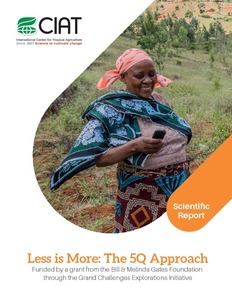Less is more: the 5Q approach
Large agricultural development projects often struggle to achieve impact because they lack costeffective systems for capturing regular feedback from implementers and beneficiaries. Even when they use a participatory approach, they cannot easily take into account a large range of farmers’ needs and make them specific. The 5Q approach makes monitoring, evaluation and impact assessment of development projects significantly easier. It can also help to achieve impact. In Phase 1, we showed how 870 farmers can provide actionable feedback in just 15 minutes at a cost of 25 cents per farmer.
5Q complements traditional methods with low-cost ICT tools to ask sets of 5 “smart” questions to all stakeholders at regular intervals throughout the project cycle. It provides near real-time feedback on what’s going well and what needs to be improved to ensure the success of the project. Specifically, the 5Q approach moves from simply collecting data to using data from multiple sources to give a clearer idea of the knowledge, attitudes, and skills that exist and that are required for the success of the project. It is participatory research in its most contemporary form.
During the 18-month pilot phase in Tanzania, 5Q was conceptually developed, and technological barriers to asking thousands of farmers for feedback were overcome. Through pilot testing in the climate-smart village Lushoto, we have shown 5Q to be cheap, effective, and attractive to large-scale development projects. Detailed results are presented in this report.

